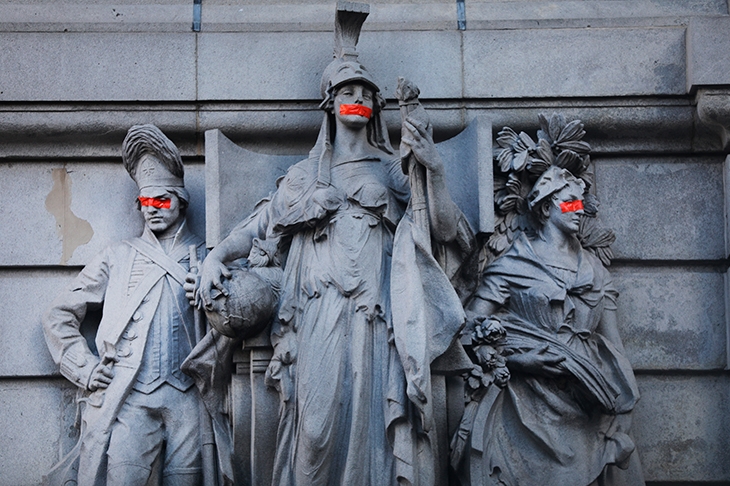It’s open season on mavericks and dissenters at the moment. If you publicly challenge any of the sacred nostrums of the social justice left and you work in a school, a college, a university, an arts company, a public broadcasting organisation, a tech company, a charity, a local authority or, indeed, Whitehall, you are at risk of being cancelled. How do I know? Because in February I set up the Free Speech Union to protect those being targeted in this way and in the past month we’ve been contacted by people in all of these fields who have either been fired, suspended or are ‘under investigation’ for having said or done something controversial, usually on Facebook or Twitter.
And by ‘controversial’ I don’t mean they’re guilty of hate speech. One person who asked for help was Mike McCulloch, a maths lecturer at Plymouth University, who was being investigated by his employer for having liked a tweet saying ‘All Lives Matter’. Then again, the definition of ‘hate speech’ is so nebulous and broad that it’s increasingly common for mainstream views to be labelled as such. For instance, another FSU member, the feminist campaigner Posie Parker, started a petition on Change.org asking the Oxford English Dictionary to keep its definition of ‘woman’ as ‘adult female human’, and the moderators took it down on the grounds it was ‘hate speech’. J.K. Rowling knows all about that, of course.
The authoritarian tide is rising and every time you think things can’t get any worse, the ground goes out from under you
I thought it was bad when I set up the FSU, and it was. According to the Telegraph, the police in England and Wales have investigated and recorded 120,000 ‘non-crime hate incidents’ in the past five years. That’s more than 65 people a day being interviewed by the authorities for precisely the kind of thing Mike McCulloch was investigated for, e.g. liking a tweet that dissents from fashionable left-wing dogma. Once that’s on your record, it shows up on an enhanced DBS check, which means you might not be able to get a job as a teacher or a carer. But things are worse by an order of magnitude since the explosion of the Black Lives Matter movement. At the FSU, we used to get half a dozen requests for help a week. Now we get half a dozen a day.
Last Sunday, for instance, I was contacted by a man called Nick Buckley, who has been fired by a charity for vulnerable young people in Manchester for writing a blog post in which he took issue with some of BLM’s policies, such as dismantling capitalism. When he republished his post on LinkedIn, a ‘poet’ called Reece Williams wrote the following comment: ‘Please know that we will be doing everything in our power to have you removed from your position. Expect us.’ Nick wasn’t all that worried because he founded the charity, has been running it successfully for nine years, and was awarded an MBE last year. But in the current Maoist climate that wasn’t enough to save him. A week later he’d lost his job.
What can be done about this tsunami of censorship? I’m tempted to say: make it illegal to fire someone for exercising their lawful right to free speech — but I don’t want to encroach on private companies’ freedom of association. What about limiting the protection to those who express political views? At present, people’s religious and philosophical beliefs are a ‘protected’ characteristic under the Equality Act 2010 and firing someone because of those beliefs is supposed to be unlawful. But in a recent case a judge ruled it was perfectly fine to sack someone for saying ‘men cannot change into women’, because that particular belief ‘is not worthy of respect in a democratic society’. The problem with legislating to protect free speech is that the law has to allow for some wiggle room, and that will give the courts all the latitude they need to find against you if you’ve said something Afua Hirsch or Owen Jones would disapprove of. You think I’m exaggerating, but I’m not. The police and the Crown Prosecution Service have been captured by the social justice cult and the Courts and Tribunals Service is not far behind.
The pro-free speech forces do win the occasional victory — Plymouth has dropped its investigation of Mike McCulloch. But the authoritarian tide is rising and every time you think things can’t get any worse, the ground goes out from under you. We need the government to defend this age-old liberty, but since when has a Conservative government actually conserved anything?







Comments